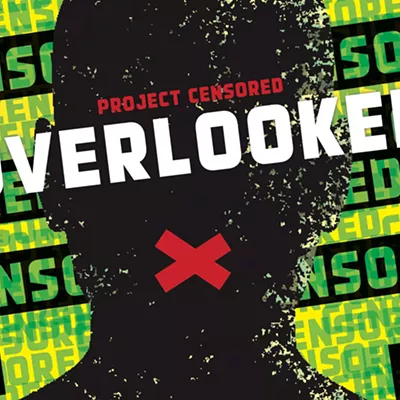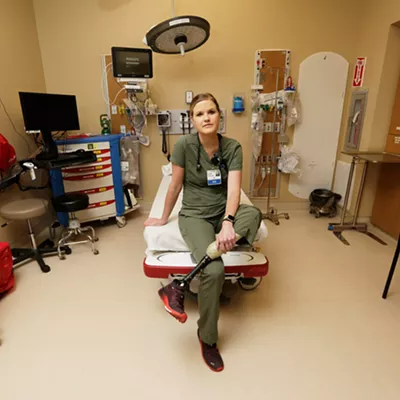Fentanyl usage is reaching epidemic proportions, as more people tell community health workers that they're intentionally using the powerful opiate. At the same time, the number of people overdosing with the drug in their system is rapidly increasing.
In a survey of needle exchange users across Washington state in September and October 2021, 42 percent of the 995 participants said they'd used fentanyl in the last three months. That's up from 18 percent in 2019. What's more, two-thirds who reported using fentanyl said they had done so intentionally, and most of that use involved pills, which are often smoked.
Such a swift rise in popularity of a drug that was hardly known in 2015 has been surprising, says Caleb Banta-Green, the syringe survey's co-author and principal research scientist at the Addictions, Drug & Alcohol Institute in the University of Washington School of Medicine.
"The fact that people are smoking is really important," Banta-Green tells the Inlander. "You have a wonderful syringe services program at the health district [in Spokane]. But now we have something like probably half of the people who are dying [of overdoses] are smoking drugs — fentanyl or methamphetamine — and we don't really have robust harm reduction programs for that."
Fentanyl contributed to or caused 11 deaths in Spokane County in 2019 and 28 deaths in 2020, according to the 2020 annual report from the Spokane County Medical Examiner. That number exploded from Jan. 1, 2021, to March 8, 2022, when the medical examiner's office saw 127 cases in which fentanyl contributed to the death, with another 87 cases still waiting on toxicology reports to see which substances may have been involved, according to the ME's office.
For decades, syringe programs have been helping people get safer supplies to reduce the spread of diseases and infections and to get people in the door so they can meet social workers and potentially access medication-assisted treatment and other services.
But Banta-Green says there is little to nothing offered when it comes to safer smoking supplies, which means people aren't coming in the door to access those other services. And many new fentanyl users are younger people who've never injected drugs, he says, meaning they may not think to access needle exchanges.
"We are seeing a decrease in clientele," says Samantha Carroll, an overdose prevention specialist and case manager at the Spokane Regional Health District needle exchange. "We used to have a line out the door, but now people are smoking the pills instead of injecting, and we've seen our population decrease."
Now, public health workers across the state are working to figure out if safer smoking supplies could be the next step in harm reduction for those suffering from substance use disorder.
HARM REDUCTION
When many needle exchanges started up about 30 years ago, largely in response to the HIV/AIDS epidemic, people were skeptical about whether the programs might cause more harm than good. But Banta-Green says the evidence is clear now that the programs not only reduce infections and the spread of diseases, but they also help case workers earn the trust of people who've often faced a lot of trauma. Once in the door, many of them get medication-assisted treatment, medical care and more.
"Supplies are often what bring people in, but what keeps people coming back are the people," Banta-Green says.
There's evidence smoking supplies could offer the same entry point. In a pilot project, the Tacoma Needle Exchange distributed smoking supplies at one of their sites starting in late 2020. Over the course of a year they saw 1,146 unique people, including 742 who were totally new to the needle exchange, according to a January 2022 report on smoking equipment that Banta-Green helped write.
"Providing smoking equipment allows a person to become engaged in a healthy relationship that could lead to things that would reduce overdose risk," Banta-Green says. "It's a public health harm reduction in the short term, but it also helps people who are super traumatized and rightfully untrusting."
Like syringes, safer smoking equipment can also reduce the spread of HIV and hepatitis, Banta-Green says. But there are legal barriers when it comes to handing out items used to do drugs.
While Washington updated its laws in 2021 so that personal possession of paraphernalia is no longer illegal, distribution of that paraphernalia is still a civil infraction.
Washington syringe exchanges were originally enabled by a 1992 court decision involving Spokane's health district, which held that health officers have broad powers to stop the spread of diseases such as HIV. But whether that same legal standard would apply to smoking equipment such as pipes, foil and other tools is unclear, according to the January safer smoking supply report.
Currently, staff at Spokane health district's needle exchange aren't even allowed to give out fentanyl test strips, which were very popular with clients. Even though a pilot project to give out test strips was spearheaded by the state Department of Health from 2018 to 2020, Spokane health district's legal team has since told staff that it isn't legal to keep doing so.
"We're kind of in a bind right now, it's like the law versus ethics," needle exchange case worker Carroll says. "The only two weapons we had to combat the overdose crisis were fentanyl test strips and Narcan. We're still handing out the Narcan, but this is a definite crisis."
Hallie Burchinal, executive director of Compassionate Addiction Treatment in downtown Spokane, says that many of the people who drop in for services every day find out they've got fentanyl in their systems when they voluntarily take urinalysis tests. Some wonder where they may have been exposed, while others are also voluntarily switching to fentanyl due to its availability and cheap price.
"We've seen a number of people that were struggling with heroin use have switched to fentanyl use," Burchinal says, "which is really a hard path, because it's so much more difficult, the withdrawals are so much more difficult."
WHAT ELSE MIGHT HELP
Law enforcement agencies continue to try to stem the flow of fentanyl coming into the state as blue pills that are sometimes mislabeled as Oxycontin and cause accidental overdoses for users who don't know what they're taking. But for those who do know what they're using, health experts continue to focus on helping those with deep-set fentanyl addiction as they try to reduce their use.
While smoking supplies could get more people through the door to access other social services, it's not clear if smoking reduces or increases the risks of fentanyl use, Banta-Green says. With heroin, there's more evidence that smoking is better than injection as far as reducing the risk of an overdose, he says, but that isn't likely the case when it comes to smoking meth or fentanyl.
Another harm reduction tactic Burchinal says she'd like to see is a free Narcan vending machine, but finding the money to pay for that may prove challenging. As it is, Compassionate Addiction Treatment, which is provided Narcan through a state program, only received 79 doses for an entire year.
The organization, meanwhile, sees 60 to 80 people come through its doors every day, many of whom are homeless and may be there to access a variety of harm reduction services.
The 69 people currently in their medication program may be prescribed Narcan by the doctors overseeing their care, Burchinal says, but other subsidized sources of the opioid-overdose reversal drug may be hard to come by.
Burchinal, Carroll and Banta-Green all said they wish people understood how effective harm reduction programs are, and that substance use disorder is truly a health issue.
"People are suffering from a medical disorder, not a moral failing," Burchinal says, noting that she wishes officials would stop throwing people in jail for drug-related issues. "I don't know anyone who's made true significant changes in their lives through shame and punitive approaches."♦
RESOURCES
Syringe Services are open Monday through Friday, 3 pm to 5 pm, at the health district at 1101 W. College Ave., Room 155. People may drop in and don't need to turn in used syringes in order to receive clean ones.
Compassionate Addiction Treatment is at 112 E. First Ave. in downtown Spokane, and is open weekdays from 8 am to 6 pm (except Wednesday when they close at 5 pm). Medication treatment is offered from 1 to 5 pm, Monday, Tuesday and Thursday.






















